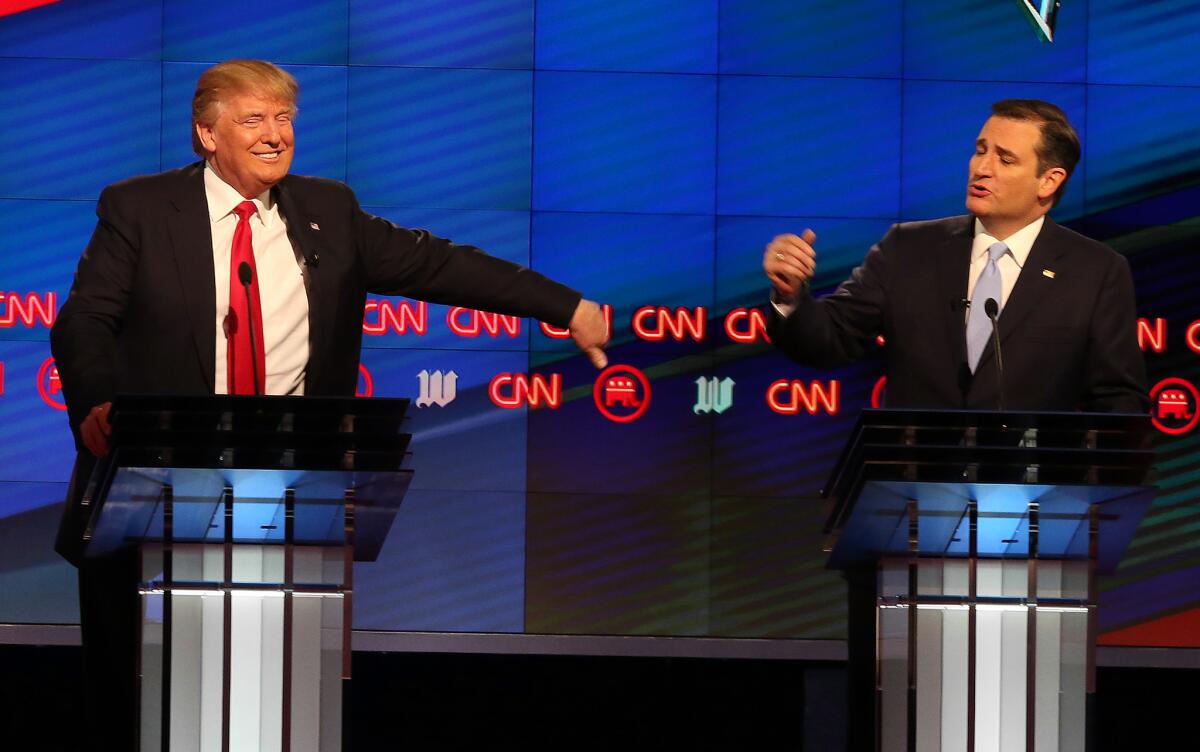Column: Ted Cruz is still the best bad option

Republican presidential candidates Donald Trump and Sen. Ted Cruz interact during a debate at the University of Miami in Coral Gables, Fla. on March 10.
Over the next six weeks, Republican voters in the remaining primary states from Indiana to California face an unenviable choice.
They can vote for Donald Trump, a boastful vulgarian who hasn’t thought much about how he would govern beyond building a wall on the border.
Or they can try to keep the GOP nomination open by voting for someone else — which in most states means Sen. Ted Cruz, the oleaginous absolutist from Texas.
To most Americans, including me, neither option looks very appetizing. As South Carolina’s puckish Republican Sen. Lindsey Graham said, it’s like a choice between “being shot or poisoned.”
My heart goes out to GOP voters who face this choice: a buffoonish megalomaniac versus a calculating zealot.
But it’s the dilemma millions of voters face, especially in winner-take-all states that give extra delegates to the first-place finisher. In those states, votes for Ohio Gov. John Kasich, a less angry conservative, won’t do much good. That’s why so many establishment Republicans, from Mitt Romney to Jeb Bush to Graham, have sheepishly announced their support for Cruz over the last few weeks — even though they don’t like him.
“He’s certainly not my preference, but he’s a reliable Republican conservative,” Graham said. “I think he’s the best alternative to beat Donald Trump.”
Graham is right. There are two reasons voters should prefer Cruz over Trump.
First, unlike Trump, Cruz has thought seriously about the job. He’s issued coherent — if bracingly conservative — proposals on tax policy, healthcare, defense spending and foreign policy. In most of those areas, Trump is still improvising.
And Cruz, a Harvard-trained lawyer, is a serious student of the Constitution. (As a boy conservative, he memorized the document.) He’s a devotee of limited government. He even has a libertarian streak, and briefly allied with Rand Paul in criticizing government surveillance programs (although he backed off after rising fear of terrorism made that stance less popular).
By contrast, Trump’s acquaintance with the Constitution seems tenuous. He has described the Supreme Court as “signing bills” and sounds impatient with the 1st Amendment; he’s threatened critics with reprisals and said he’d like to make it easier to sue newspapers for libel.
Second, a Cruz candidacy would be a useful experiment in American politics: It would test the conservative argument that Republicans would win more elections if they only nominated unambiguously right-wing candidates.
“We need to learn from history,” Cruz said in 2014. “If we run another candidate in the mold of a Bob Dole or a John McCain or a Mitt Romney, we will end up with the same result, which is millions of people will stay home on election day.… The only way for Republicans to win, I believe, is to run a candidate who runs as a strong conservative with a positive, optimistic, hopeful message.”
That’s been an article of faith in the conservative movement since the era of Ronald Reagan. But Reagan combined rugged Republican ideology with a winning personality. Nominating Cruz, who has none of Reagan’s charm, would be a purer test.
“If Cruz loses to Hillary … conservatives will have no choice but to reassess the idea that too little conservatism has been the only problem with recent national tickets,” Republican writer Dan McLaughlin wrote in National Review, referring to Hillary Clinton, while listing reasons GOP moderates should vote for Cruz.
Besides, he added, if Cruz doesn’t get the nomination this time, he’s sure to be back four years from now. “If you think Cruz is a disaster waiting to happen, better to let him happen now and have a chance at a more moderate or at least more moderate-sounding nominee next time.”
If Trump won the nomination but lost the presidential election, that would teach the GOP no lesson at all. Republicans would dismiss the campaign as an aberration — as the year their party temporarily went mad.
Unlike Graham and other establishment Republicans, I’m not making an argument about electability here. I’m not urging GOP voters to choose Cruz because he’d be a stronger candidate in the general election — because I don’t think we can know whether that’s true.
Cruz isn’t an easy candidate to love. He’s capable of breathtaking opportunism and demagoguery. He spent much of last summer praising Trump (“I think Donald’s terrific”) when that looked like a way to attract Trump’s followers; now he says Trump is a danger to the republic. He has matched Trump’s hard-line stands on deporting immigrants who are in the country illegally and barring Muslim refugees from entering the United States.
Last week, he took the Republican race into the bathroom, painting transgender people as potential sexual predators. “Grown adult men, strangers, should not be alone in a bathroom with little girls,” he said, defending the North Carolina law that would force transgender people to use the restroom corresponding to the gender on their birth certificate. (On that controversy, Trump struck an unexpectedly sensible note; why not let people use whatever bathroom they’re comfortable in?)
So my heart goes out to GOP voters who face this choice: a buffoonish megalomaniac versus a calculating zealot. Lindsey Graham was right. It’s like a choice between being shot or poisoned. So take the poison. At least it will help clarify a thing or two about the Republican Party.
Twitter: @doylemcmanus
Follow the Opinion section on Twitter @latimesopinion and Facebook
More to Read
A cure for the common opinion
Get thought-provoking perspectives with our weekly newsletter.
You may occasionally receive promotional content from the Los Angeles Times.











